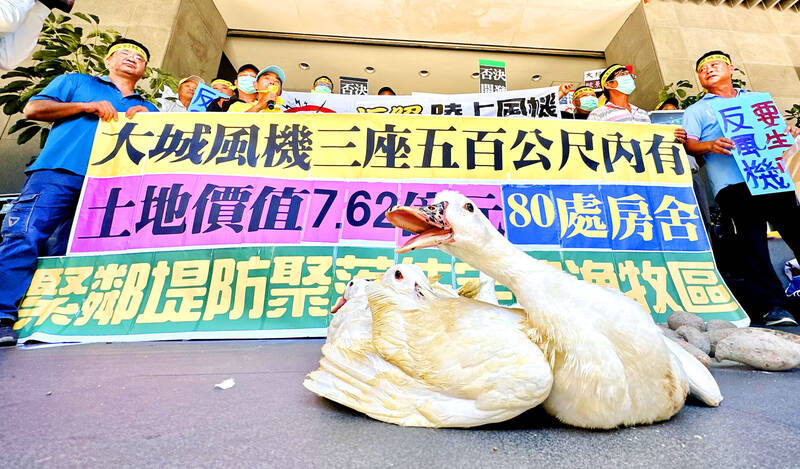Representatives from Changhua County’s Dacheng Township (大城) yesterday gathered in front of the Ministry of Environment in Taipei to protest a construction project that aims to install three onshore wind turbines near local private residences and aquaculture farms, urging the environmental impact assessment (EIA) committee to veto the project.
The developer proposed building three onshore wind turbines along the coastal levee in the township that would have a collective capacity of 12.78 megawatts.
Changhua Environmental Protection Union secretary-general Shih Yueh-ying (施月英) said that freshwater clams farmed in the township account for 70 percent of total production nationwide.

Photo: Lo Pei-de, Taipei Times
A symbiotic system has formed among local people, the ecology and industries of the township, and should not be disrupted, she said.
There are 80 private houses and barns within 500m of one of the three proposed turbines, but the developer only documented 12 houses, Shih said.
Debris from broken wind turbine blades could be blown as far as 360m, she said, citing damage to Taichung Port’s wind turbines by Typhoon Soudelor in 2015.
That is a real risk for the community given the housing density, Shih said.
Union president Hung Hsin-yu (洪新有), a local farmer, expressed concern over potential pollution by the wind turbines.
For example, five of the 20 turbines set up in the county’s Fangyuan Township (芳苑) leaked oil into aquaculture farms and caused great losses, he said.
Local residents also expressed concern that noises and shadow flickers of wind turbines might harm the mental health of local residents, as well as distress livestock and freshwater clams.
Local resident Chen Yi-hsien (陳益顯) said that freshwater clams are sensitive to stimuli such as vibrations from turbines and would become too nervous to eat.
The EIA committee reviewed the proposed project yesterday.
The county government said the developer failed to explain the necessity of building the three turbines and did not provide solid data on the turbines’ swept areas as required by committee members in the previous EIA meeting.
Although about 100 sightings of black-faced spoonbills were documented around the project site this year, the developer did not evaluate the impact of the project on the endangered species, it said.
The committee said that shadow flickers might not be solved simply by installing light-shielding facilities, as the problem could also affect the fish and clams in local aquaculture farms.
Although the turbines would be built on national land, the swept areas could be broad enough to cover private land, which would involve the issue of surface rights and should also be considered, it said.
As all three turbines are large — at least 150m tall — and expected to be set up near the coastal levee with strong winds, the impact of their vibrations on the earth embankment should be evaluated, it added.
The committee advised against the project and would send the proposal to the EIA Council for final resolution.
The developer can put forward more arguments to appeal the decision with the EIA Council, it said.

SHIPS, TRAINS AND AUTOMOBILES: The ministry has announced changes to varied transportation industries taking effect soon, with a number of effects for passengers Beginning next month, the post office is canceling signature upon delivery and written inquiry services for international registered small packets in accordance with the new policy of the Universal Postal Union, the Ministry of Transportation and Communications said yesterday. The new policy does not apply to packets that are to be delivered to China, the ministry said. Senders of international registered small packets would receive a NT$10 rebate on postage if the packets are sent from Jan. 1 to March 31, it added. The ministry said that three other policies are also scheduled to take effect next month. International cruise ship operators

NUMBERS IMBALANCE: More than 4 million Taiwanese have visited China this year, while only about half a million Chinese have visited here Beijing has yet to respond to Taiwan’s requests for negotiation over matters related to the recovery of cross-strait tourism, the Tourism Administration said yesterday. Taiwan’s tourism authority issued the statement after Chinese-language daily the China Times reported yesterday that the government’s policy of banning group tours to China does not stop Taiwanese from visiting the country. As of October, more than 4.2 million had traveled to China this year, exceeding last year. Beijing estimated the number of Taiwanese tourists in China could reach 4.5 million this year. By contrast, only 500,000 Chinese tourists are expected in Taiwan, the report said. The report

Temperatures are forecast to drop steadily as a continental cold air mass moves across Taiwan, with some areas also likely to see heavy rainfall, the Central Weather Administration (CWA) said. From today through early tomorrow, a cold air mass would keep temperatures low across central and northern Taiwan, and the eastern half of Taiwan proper, with isolated brief showers forecast along Keelung’s north coast, Taipei and New Taipei City’s mountainous areas and eastern Taiwan, it said. Lows of 11°C to 15°C are forecast in central and northern Taiwan, Yilan County, and the outlying Kinmen and Lienchiang (Matsu) counties, and 14°C to 17°C

STEERING FAILURE: The first boat of its class is experiencing teething issues as it readies for acceptance by the navy, according to a recent story about rudder failure The Hai Kun (海鯤), the nation’s first locally built submarine, allegedly suffered a total failure of stern hydraulic systems during the second round of sea acceptance trials on June 26, and sailors were forced to manually operate the X-rudder to turn the submarine and return to port, news Web site Mirror Daily reported yesterday. The report said that tugboats following the Hai Kun assisted the submarine in avoiding collisions with other ships due to the X-rudder malfunctioning. At the time of the report, the submarine had completed its trials and was scheduled to begin diving and surfacing tests in shallow areas. The X-rudder,